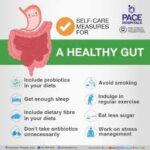Gut Health and Digestion: Probiotics, Fibre, and Natural Solutions for a Balanced Body
Gut Health: A Key to Total Wellness
A healthy gut is essential for your overall well-being. It’s more than just a digestive system—it plays a powerful role in immunity, energy, mental clarity, and even mood. Unfortunately, gut health is often overlooked until problems like bloating, constipation, or fatigue appear.
This guide explains how to support your gut with probiotics and prebiotics, recognize signs of an imbalanced microbiome, understand the gut-brain connection, increase fibre for colon health, and use natural remedies to ease bloating and manage IBS.
What Is the Gut Microbiome?
Your digestive system is home to trillions of microorganisms—mainly bacteria, but also fungi and viruses—collectively called the gut microbiome. These microbes help digest food, absorb nutrients, produce essential vitamins like B12 and K, regulate inflammation, and support immune function.
When the gut microbiome is balanced, it enhances digestion, strengthens immunity, and contributes to mental well-being. However, poor diet, stress, lack of sleep, and overuse of antibiotics can disrupt this balance, leading to a wide range of health problems.
Probiotics and Prebiotics: The Dynamic Duo
Probiotics
Probiotics are live, beneficial bacteria found in certain foods and supplements. They help replenish and support healthy gut flora, especially after illness or antibiotic use.
Benefits of Probiotics:
- Improve digestion and nutrient absorption
- Support immune system function
- Help manage diarrhea and gut infections
- Reduce symptoms of irritable bowel syndrome (IBS)
- Promote mental wellness through the gut-brain axis
Food Sources:
- Yogurt with live cultures
- Kefir
- Sauerkraut
- Kimchi
- Miso
- Fermented pickles
- Probiotic supplements
Prebiotics
Prebiotics are non-digestible plant fibers that feed the good bacteria in your gut, helping them grow and stay active.
Benefits of Prebiotics:
- Feed healthy gut bacteria
- Reduce inflammation
- Support better calcium absorption
- Help lower the risk of colon cancer
Food Sources:
- Bananas
- Onions and garlic
- Leeks and asparagus
- Chicory root
- Oats and barley
- Apples and flaxseed
Together, probiotics and prebiotics form a combination called synbiotics, which work synergistically to strengthen and balance your gut ecosystem.
Signs of Poor Gut Health
An unhealthy gut doesn’t just cause digestive discomfort. It can affect many systems in your body. Here are common signs your gut may be out of balance:
- Frequent bloating and gas
- Constipation or diarrhea
- Food intolerances or sensitivities
- Fatigue or poor sleep
- Recurring colds or infections
- Mood swings, anxiety, or depression
- Brain fog or difficulty concentrating
If you experience several of these issues, it may be time to evaluate your gut health and start making changes.
The Gut-Brain Connection
The gut-brain axis is the communication link between your digestive system and your brain. Your gut produces up to 90% of serotonin—the neurotransmitter responsible for mood, appetite, and sleep regulation.
When your gut is unbalanced, it can impact your mental health. Chronic stress also affects the gut by increasing inflammation and altering gut flora. That’s why managing stress is just as important as a healthy diet.
Tips to Strengthen the Gut-Brain Axis:
- Practice stress-reducing techniques like meditation, deep breathing, or yoga
- Maintain regular sleep routines
- Exercise daily to support gut and brain function
- Include foods rich in omega-3 fats and fermented products
Fibre: Essential for Colon and Digestive Health
Fibre is a critical part of digestive wellness. It comes in two forms:
- Soluble fibre: dissolves in water to form a gel and helps control blood sugar and cholesterol
- Insoluble fibre: adds bulk to stool and promotes regular bowel movements
Benefits of Dietary Fibre:
- Prevents constipation
- Supports beneficial bacteria growth
- Lowers the risk of colon cancer
- Regulates appetite and weight
- Reduces the risk of digestive disorders like diverticulitis
High-Fibre Foods:
- Whole grains: oats, quinoa, brown rice
- Legumes: beans, peas, lentils
- Vegetables: spinach, carrots, broccoli
- Fruits: apples, berries, oranges
- Nuts and seeds
Adults should aim for 25 to 30 grams of fibre per day. Introduce fibre slowly to your diet and drink plenty of water to avoid discomfort.
Natural Remedies for Bloating and IBS
For Bloating Relief:
- Peppermint tea: relaxes the digestive tract and relieves gas
- Ginger: improves digestion and reduces inflammation
- Fennel seeds: ease cramping and reduce gas
- Activated charcoal: absorbs excess gas (use cautiously and consult a doctor)
- Chew thoroughly and eat slowly to prevent swallowing air
For Managing IBS:
- Low-FODMAP diet: reduces fermentable carbs that cause symptoms
- Probiotics: restore healthy bacterial balance
- Regular exercise: improves gut movement and reduces stress
- Hydration: supports digestion and stool movement
- Mindfulness practices: yoga, journaling, or therapy can relieve stress-related IBS
Always consult a healthcare provider before trying new diets or supplements, especially if you have a diagnosed condition like IBS.
Conclusion: A Balanced Gut = A Balanced Life
Your gut does more than digest food—it protects your immune system, regulates mood, produces vital hormones, and affects your energy levels. Maintaining gut health is key to feeling your best both physically and mentally.
By incorporating more probiotic- and prebiotic-rich foods, eating enough fibre, managing stress, and using natural remedies for common digestive issues, you can take meaningful steps toward long-term health.
Remember, a healthy gut is built on consistent habits, not quick fixes. Start small—add fermented foods to your diet, walk daily, get enough rest—and your gut will thank you.
